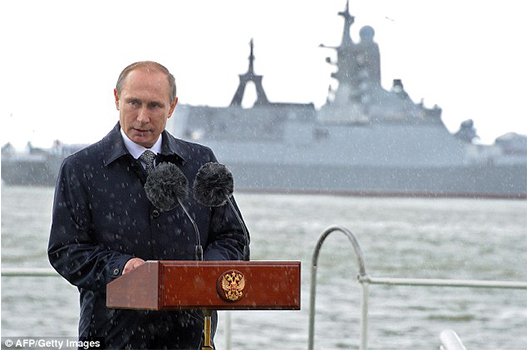 Samuel Johnson famously told his biographer James Boswell, “Clear your mind of cant.” In thinking about European security, we should do so, too.
Samuel Johnson famously told his biographer James Boswell, “Clear your mind of cant.” In thinking about European security, we should do so, too.
Russia’s latest actions of mobilizing its forces, fabricating pretexts for war, and breaking agreements show that it still believes that by force or threats, it can revise European borders and the status quo. Given Moscow’s behavior, however, we need to view reality clearly and strengthen our capacity to deter its threats.
First, we should stop repeating that NATO has moved from assurance or reassurance to deterrence. This mantra is simply not true. While the steps taken at Wales and Warsaw are commendable, eight battalions strung from the Baltic to the Black Sea will not deter a Russian invasion or successfully defend against it. Nor will NATO’s rapid reaction forces be of much use without the buildup of an infrastructure that can sustain them in Germany, Poland, and the Balkans. In the Black Sea, the evisceration of the Turkish military’s combat capability as result of the failed July coup and subsequent purge of its armed forces is forcing a reevaluation of regional defense plans there. And given Turkey’s new foreign policies, can NATO count on the country to grant it naval access to the Black Sea?
In other words, NATO must generate a much stronger conventional deterrent of land, sea, air, air defense, and electronic capabilities, along with an infrastructure to sustain its forces in the Baltic and Balkans. Yet few NATO countries seem willing to do this, or are even cognizant of the need. Absent credible deterrence, reassurance is merely a word.
A second myth is that the Baltic States cannot be defended because of Russia’s proximity and local conventional superiority. Many analysts advance this concept, but it has no foundation in military history or reality. Admittedly, Moscow can mobilize forces much faster than NATO and the Baltic States can and currently possesses superiority there. But the belief in the indefensibility of the Baltic region is a self-serving myth borne of ignorance and lack of will.
In the Crimean War, Great Britain blockaded the Baltic Fleet successfully, as did Germany in World War I. Between the world wars, the British Fleet kept the peace there. Even in 1943-44, Soviet forces could not prevail there until the German army simply wore down. And today’s Baltic Fleet, as we have seen, is hardly invincible. In fact, the Baltic region can be defended if NATO makes the necessary investments in land, sea, air, air defense, and electronic warfare capabilities. Of course, were a battle to occur there, NATO would suffer considerable casualties, but it would prevail, and Russia knows it.
Analysts should be pushed to prove claims that NATO cannot defend the Baltic: otherwise, there will always be an audience for such talk, as long as allies believe they can have defense and security without paying for it. Genuine deterrence is well within NATO’s grasp, but it has to understand what it is dealing with and make the necessary investments to provide both reassurance and deterrence.
Finally, there is the myth, cherished by many high-ranking members of the administration, that the president could declare ‘no first use’ and appeal to the UN to pass a resolution against nuclear testing. This is despite the fact that Congress, which has the statutory and constitutional obligation to vote on treaties, refused to accept the test-ban treaty. Those people clamoring for no first use apparently believe that by a unilateral act, Washington can calm its adversaries, who will have to follow suit by virtue of an invisible moral force..
Yet examination of Russia’s large-scale nuclear buildup shows that Moscow is not only modernizing all of its nuclear weapons, it is fast approaching the numerical limits of the New START Treaty. Additionally, it has broken or violated all of the arms control treaties it has signed, and is building or testing new low-yield and hypersonic nuclear weapons with both counterforce and countervalue capabilities. Russia has used chemical weapons at home and supplied them to Syria, where they are being used. Moreover, experts harbor doubts as to whether Russia has closed down its biological weapons program.
Russia’s possession of a huge conventional superiority in both the Baltic and Black Sea advertises its willingness to strike first with nuclear weapons. To renounce first use now not only invites another conventional “Blitzkrieg” in the form of a limited war, but also encourages Moscow to believe it can threaten first use with little risk, as it currently does.
What is needed is serious thinking about European and international security, not self-serving, credulous myths about war, peace, our capabilities, and Russia. Although sound thinking cannot guarantee us any certitude, it does give us the capability to correct our mistakes and, equally important, dispel both our own and our adversaries’ illusions.
Stephen Blank is a Senior Fellow at the American Foreign Policy Council.
Image: Russian President Vladimir Putin at the Baltic Sea in 2015. Credit: AFP/Getty Images.
